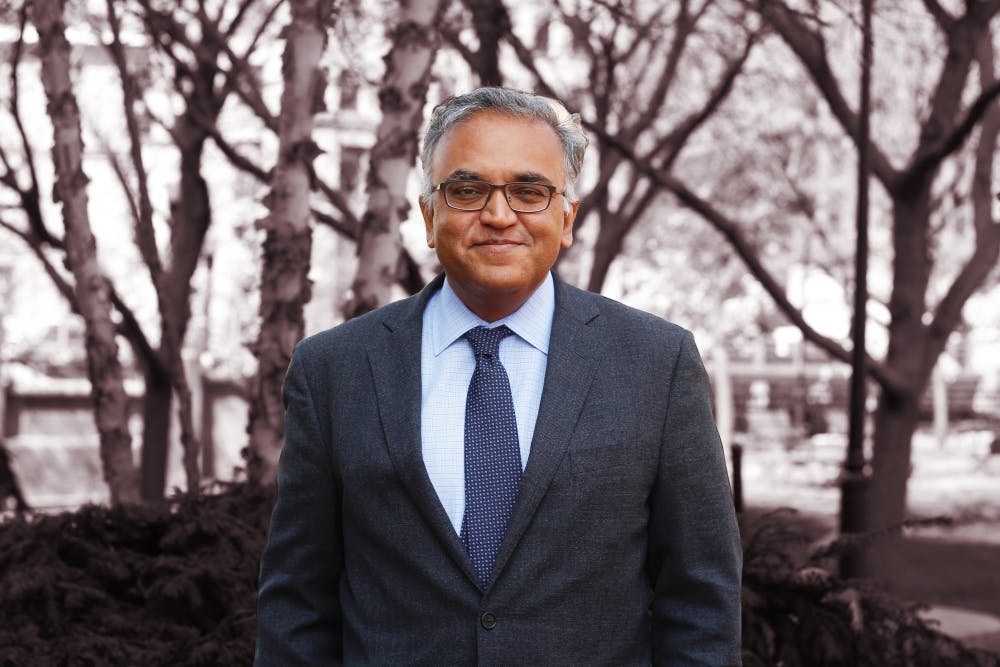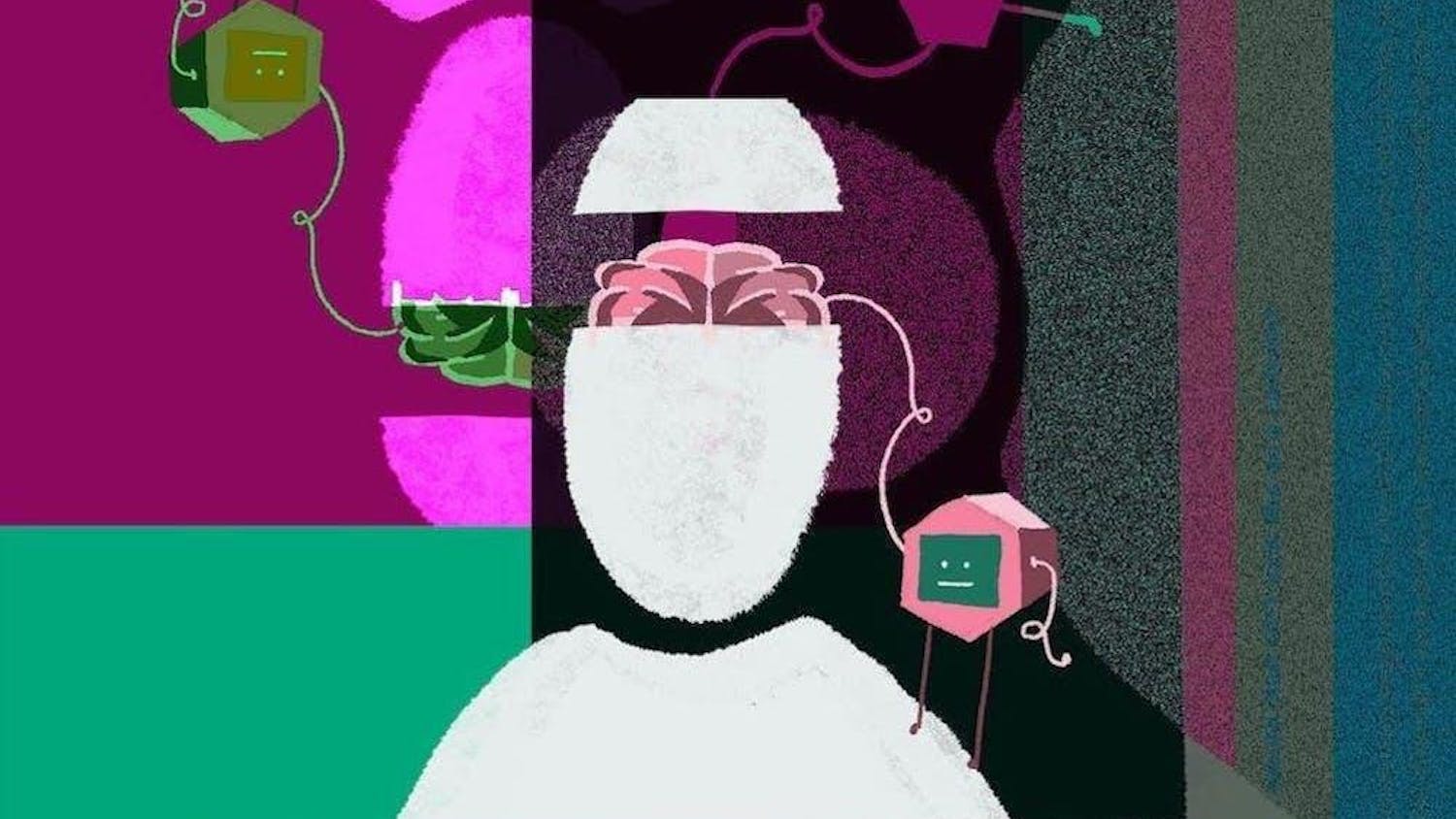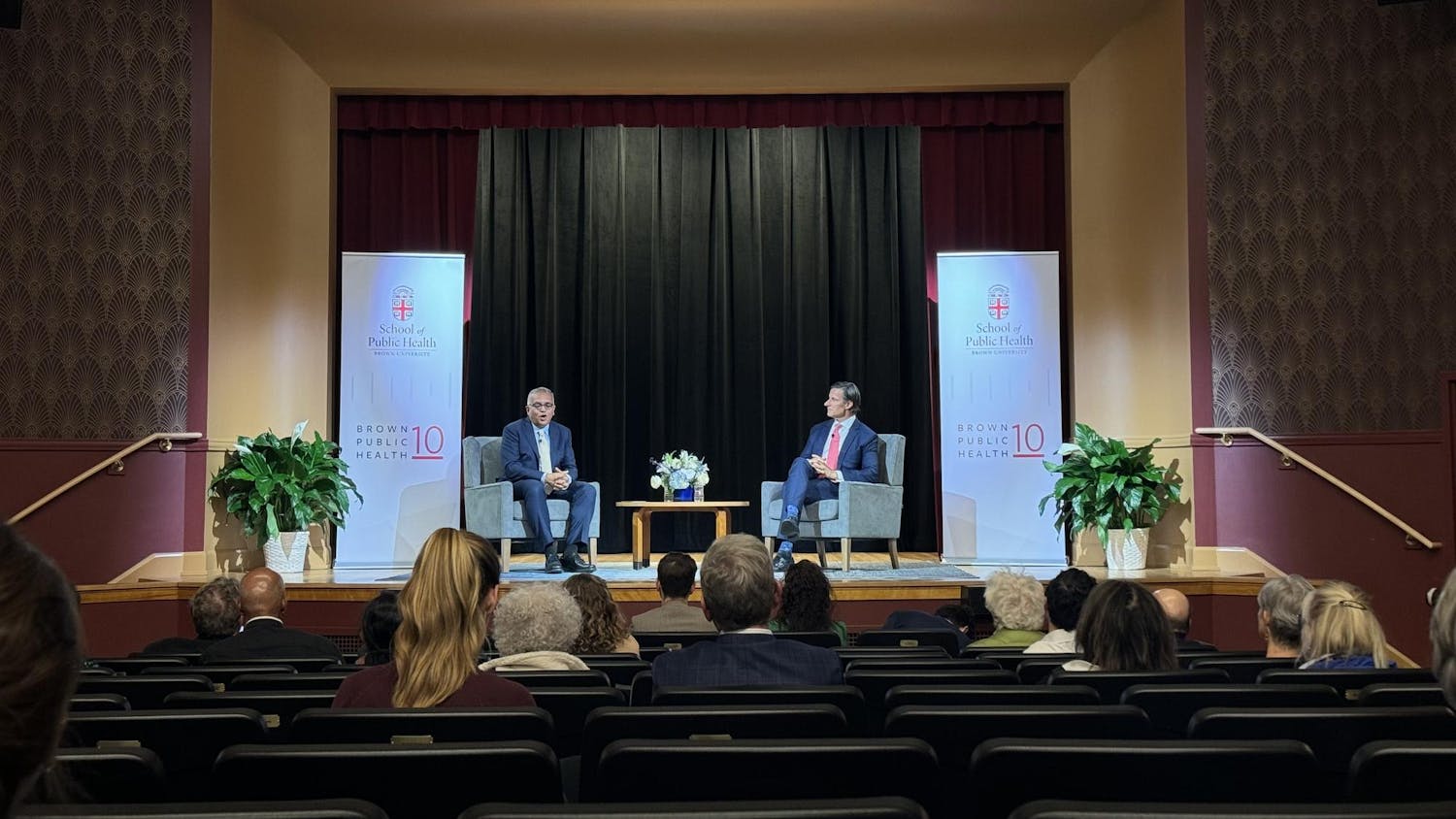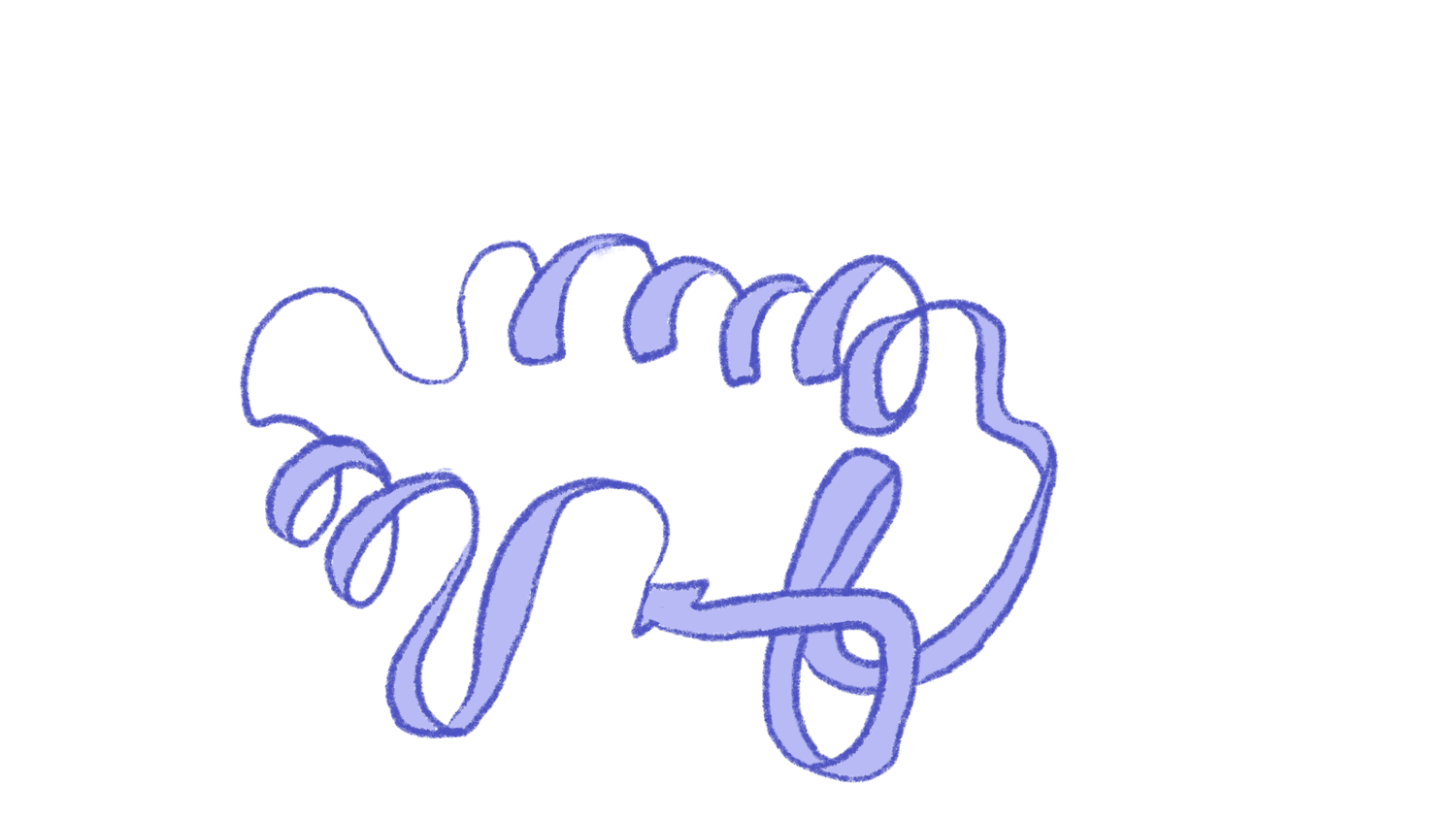In October 2020, The Herald launched a podcast with Ashish Jha, Dean of the School of Public Health at Brown University. At the end of our first call, Dr. Jha said: “If people stay focused, there’s a lot of good news coming in 2021.” Specifically, he added, “we’re going to have multiple vaccines that are safe and effective.”
In the hours after the call, as the podcast's producer, I stitched our voices together into the first episode of “The COVID Pod with Dr. Ashish Jha.” This name was a play on the word we had all started to hear around campus as groups of students formed small covid “pods” to limit potential exposure to the virus. Via virtual Zoom meetings, Herald staffers and I welcomed Dr. Jha to our “pod” each week to answer questions and comment on current events.
Each new episode of the podcast inspired added optimism. On Nov. 13, we talked about early data from Pfizer that its vaccine could be90 percent effective. Dr. Jha said: “There’s been a light at the end of the tunnel, and the light just got a whole lot brighter.”
Since then, we’ve seen Pfizer’s vaccine and others — namely, Moderna and (prior to its pause) Johnson and Johnson’s vaccines — get authorized and implemented. All Rhode Island residents over 16 years old became eligible for the vaccine on April 19 — and the same was true for adults across the country. On April 10, during the final episode of the podcast, Dr. Jha postulated what a “normal” fall could look like, given that Brown will mandate students be vaccinated upon their return to campus.
For good reason, our podcast’s archives may now mostly lie unlistened in the backlogs of Spotify. I understand why few people would want to seek out a commentary recorded on Oct. 16 of 2020 as we enter the summer of 2021 — but its existence alone is a time capsule, a map of what we knew when we knew it. And on those 30 minute calls with Dr. Jha, we grappled with uncertainty in real time — together, but apart. Our faces may have been relegated to a Zoom grid and our conversation controlled by the click of the mute/unmute button, but each week, we not only learned how to navigate the present day, but also thought about what things could be like when the pandemic eventually came to an end.
As journalists, we learned how our questions and words could pragmatically help keep the public healthy. And as students planning for our futures, some of us aspiring doctors, we learned how to communicate complex health issues in ways that were meaningful to our own community, but also the general public.
So on April 2, I met with Dr. Jha on Zoom to discuss Commencement — but also optimism and transitions in the COVID-19 response and in life.
Cate Ryan:
You've talked a lot about being optimistic at times throughout the pandemic. It’s been a dark year and we've all been looking for that light at the end of the tunnel, but is it hard to feel optimistic sometimes?
Ashish Jha:
I always remind people, every pandemic ends — there's no such thing as a forever-going-on pandemic. Every pandemic ends; this pandemic will. And so we have to do two things: We have to keep our eye on that, and then we have to protect people and protect lives and livelihoods and wellbeing while we get there.
He said, “We will get through this.” And I said, almost without thinking, “And we will get through this because of science.” I smiled, and he said, “Yes, because of science.”
I've had this deep-seated faith in science and the scientific community to get us out of this pandemic. I remember the conversation with Dr. Fauci in August, which was my first Brown event. As we were talking through issues, he said, “We will get through this.” And I said, almost without thinking, “And we will get through this because of science.” I smiled, and he said, “Yes, because of science.”
I've been able to watch how the scientific community has responded. And that has kept me very confident that we were going to come to a finish line. I felt like my job was both to communicate that, but also to offer advice about how to keep people safe until then.
Cate Ryan:
Even with the optimism, what do you think were the phases of the pandemic that were most difficult for you — to wrap your head around and to provide advice and to have faith in the science? Was there ever a moment where you were worried things weren't going to work out the way they have now?
Ashish Jha:
There have been a few moments during the last 14 months where I've really been caught off guard. One of them was relatively early on.
Last March, my mental model was: It’s humanity versus virus. I know which side I'm on. That felt really simple and straightforward and clean. My job as a public health scientist was to learn about the virus, think about how it's going to spread, think about what we need to do from a policy point of view.
There was a moment last April, in conversations with people at the White House, that I realized that we could come up with the right answer. And it wasn't gonna get done. And it wasn't going to get done because there were people in the White House who believed that their political advantage lay in not doing the right thing. That was the first moment my naive view of ‘it's humanity versus the virus’ kind of burst. And I realized it's actually not just humanity versus virus. It's far more complex. And in a way that was really disconcerting. And obviously, that kept coming up over and over again.
Soon thereafter, I started discovering this incredible, well-organized disinformation campaign that questioned masks, questioned restrictions, called all of this a hoax, blamed China. It made me realize this wasn't just in response to stress that people were sharing that information — there were people out there actually trying to undermine public health.
On the upside, watching how well the scientific community came together has been really impressive. An interesting evolution in my thinking was realizing that the job of public health in the beginning was to understand the biology, the mechanism, the epidemiology, but our job by the time we got to January, February, March of this year, was to understand the sociology, the politics, the economics — as those things were far more dominant. The (epidemiology) of this virus has been known since April or May, and no longer drives what's going on. It's much more social cohesion, it's much more about political will, it's much more about governance, that really drives how the pandemic is going. And I think most people don't realize that.
Cate Ryan:
How do you think students who are graduating, who are going out to do various things next year and into the future, can use the experiences that we've had during this pandemic — but also our experience watching experts like yourself handle it — as we move into our futures?
Ashish Jha:
There's an old saying that wars are too important to be left to the generals. And pandemics are too important to be left to the public health experts. Public health experts, like generals, have a really important role. But you don't want to fight a war without generals, right? Like you really need them — you don't want to fight a pandemic without public health experts. But these are society-wide events. This is not something that only affected the public health community; it affected all of us in these deeply, profoundly important ways. And if I had one critique, one thing that I wish was different — I wish that more sectors of our society spoke up and played an active role in responding.
There's an old saying that wars are too important to be left to the generals. And pandemics are too important to be left to the public health experts.
Certainly Brown graduating seniors, in their careers, will have lots of leadership roles. But even in the beginning, don't sit these things out. Get involved, get engaged; you don't have to become the expert, but what we need is an all-of-society response — we want people to feel vested in solving these problems.
Cate Ryan:
I was wondering if you could talk about the transitions that you've had in your life, in your career up until now. This year, starting this new role at Brown during the pandemic was obviously a big transition.
Ashish Jha:
So my kind of personal life story is that I was born in India, I came to the United States when I was 14, but I lived in Canada for a few years before that. When I showed up at college, I had this really interesting kind of identity crisis of like: Who am I? Am I an Indian kid? Am I an American? And those issues of identity are things that lots and lots of people face. Not just immigrants, though immigrants classically face them, but lots of people think about those kinds of things.
Issues of identity come in all forms, from gender identity to sexual orientation, to race, ethnicity. Different people experience them at different times. The book that helped me the most in understanding and thinking about this issue, when I was 20, was The Autobiography of Malcolm X, which was a book all about identity. But of a Black man growing up in the '40s, and '50s. And then kind of really, in the '60s became very prominent. That was transformational.
In high school, I had a teacher who told me that if I was ever going to be successful in America, I had to change my name. And I had to pick an American name because nobody could ever say the name Ashish. He was very sweet about it — he's like, “Listen, I think you have potential, I think you could make something of yourself. But you're never going to do it with a name like Ashish, because no one can say Ashish.”
And in that context, that moment in college was transformational and made me feel like I could, and that I had to. It wasn't even like I could be successful with keeping my name and identity. But I had no choice. I had to be Indian, because I was Indian. And I had to be American, because I was, and it really helped me. That had this very profound effect on me — really feeling a very different sense of confidence about the kinds of choices I was willing to make, decisions I was willing to make.
I went off from college to medical school. The other inflection point I think about is trying to decide after residency what kind of career I wanted. The best piece of career advice I got was from a mentor of mine, who said to me: “The biggest predictor of career satisfaction is not what you do. It's who you work with.” I took it to heart.
In my entire career, I have made decisions about what to do next based on who I would get to work with, and it has always paid off. There are a whole bunch of people here that I just thought, these feel like my people, and I want to go hang out with them. These are the people I want to be learning from. And that was probably my single biggest motivation.
I've loved this transition to Brown. It is totally bizarre to start a new job in the middle of a pandemic. I have not physically met 98 percent of my faculty; I see them on zoom. That will all change over the next year. So it's all very, very strange. But the point is that you have no choice. I didn't sign up to become Dean in the middle of a pandemic. But that's what I was faced with. We've all got to do this. And we have to find ways of adjusting.
Cate Ryan:
What do you think has been a source of motivation for you going through this year? In particular, with COVID, but also just your career in public health as a whole?
Ashish Jha:
This is kind of the oldest line in the book, but I really felt like I could help people — I really felt like I could make a difference in people's lives. In medicine you see that very acutely and very plainly. What I found attractive about public health was the ability to have a positive impact in people's lives who would never know that I had done anything. In medicine, you do something for your patient, you make a diagnosis, you give them a treatment. They know you've helped them. The gratitude is very direct and meaningful. And it's wonderful, I love it. Don't get me wrong. In public health, when you do things, you have no idea who you helped, they have no idea that you did anything useful for them. There is something kind of magical, something that feels deeply meaningful about that.
This year, there were multiple times kind of early on when I thought, I gotta just stop all this media stuff, it's not really clear to me that I'm doing any good. I started talking to friends and family and got a lot of feedback from people who felt like my being on TV, my being on the news, was a source of information and comfort and help to them. My experience, of course, Cate, is I go stand in front of a computer, I see a blank screen. I don't even see the anchors 90 percent of the time. And so I see nothing but a blank screen, and I talk into a blank screen, and I talk for like four or five minutes. And then it ends and I go back to doing what I was doing. And I have no idea — Did anybody see that? Was that useful to the world? I have no idea who has been helped by any of the stuff I've done in the past year.
In public health, when you do things, you have no idea who you helped, they have no idea that you did anything useful for them. There is something kind of magical, something that feels deeply meaningful about that.
But you know, I do your podcast. And I will get an email from a student who says that was really helpful. Great. I love that. But, I really actually like the fact that there are people out there who I don't know, they don't know me, but this has been helpful to them. And that feels meaningful to me.
Cate Ryan:
Even having a small part in that with the podcast has been so meaningful. All of us always talk about how we feel like we're doing something at least beneficial to the Brown community with that podcast, so thank you for that.
I also wanted to ask, when you graduated college, I mean, obviously you would not have foreseen the COVID-19 pandemic, but did you dream of having the career that you have now? Or did you never think that this would be the path you would go down?
Ashish Jha:
I had decided I was gonna go off to medical school. I knew I wanted to do more than just practice medicine. But I didn't know what that meant. And if you had told me that I would have a career in public health, that I'd become the dDean of pPublic hHealth — I never would have expected any of that.
Part of it is, I didn't even know what I didn't know. I can look back now and draw a pretty linear career path. But it's never felt linear. It always felt a little ziggy and a little zaggy.
What I wanted was a career that I felt would be meaningful while I was doing it and would be meaningful when I looked back. And, I wanted to make sure I was having fun while I was doing it too. And that has definitely been the case.
I have loved my jobs. Mostly because I get to hang out with really smart, interesting people. And we have a good time, we like to work on really interesting problems. We try to think about how to make the world a better place. Public Health is a great lens into that. And I think none of us would’ve wished that we were using these skills in a global pandemic — here were plenty of health issues to work on before the pandemic — but to the extent that you get to use these skills in a pandemic to help people is that much more meaningful.
Cate Ryan:
My friends and I sometimes talk about how we will look back on our college years with this lens of the pandemic. How do you think that you'll look back on this later on in life and how do you think the world will look back on this time historically, and what do you hope we will have learned?
Ashish Jha:
As horrible as the pandemic has been, I am excited about the possibilities it has revealed. Societies evolve slowly on a set of issues. But there are moments when the possibility of big change opens up. And this is one of those moments.
I am hoping that five, 10 years from now we can look back at this moment, and say as horrible as that pandemic was, we used it as a moment to pivot on a set of issues. We built a global public health infrastructure that really prioritized people's health and well-being. We began to really deal with structural inequities in our own country in a way that was far more serious than we'd ever done before.
There's a set of things that have been slow, hard, where we haven't made as much progress as we need to. And I'm hoping that we can look back at this moment and say, we finally were able to break through and make real progress. I feel very confident that we can. And that would be a really good outcome from what is otherwise pretty much an unmitigated, horrible disaster.
Cate Ryan:
And then my last question, you kind of already touched on this: I was wondering what your one piece of advice for a graduating senior would be this year.
Ashish Jha:
Work with great people and work on problems that are important. Work with great people because that's how you get smarter. That's how you get better. That's how you reinforce your values and strengthen your values. And, you know, I am surrounded by people who have incredible integrity, and their integrity makes my integrity better. I’m surrounded by people who I believe are way smarter than I am. That helps me be smarter and more thoughtful about things.
The second part is really important, which is there's meaning in all sorts of work, but if you have the opportunity to work on problems that really matter in people's lives, it's a phenomenal privilege. I've said to students over the years, and I've thought about this myself: Probably the greatest privilege after the opportunity to work with awesome people is that I get to work on things that really make a difference in people's lives. And I think if you have that opportunity, you should take it.
This interview has been edited for length and clarity.





